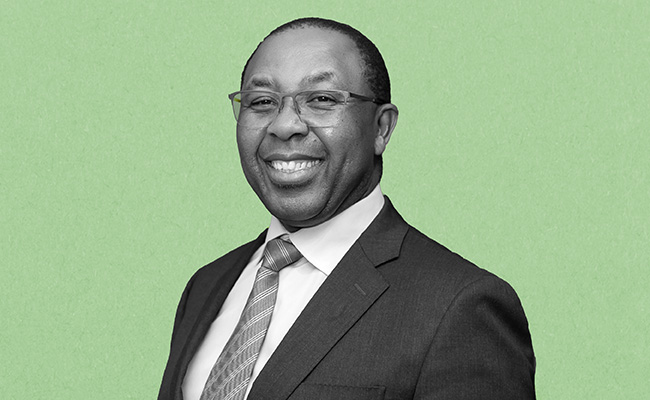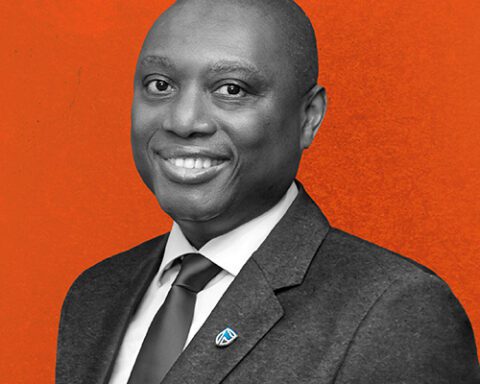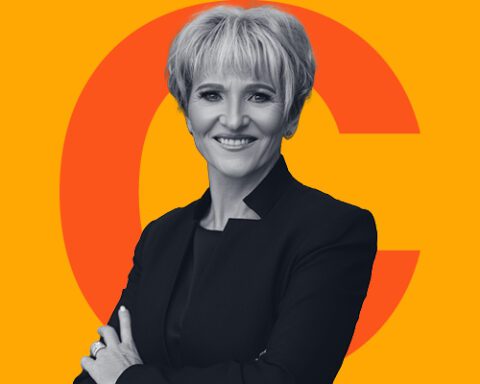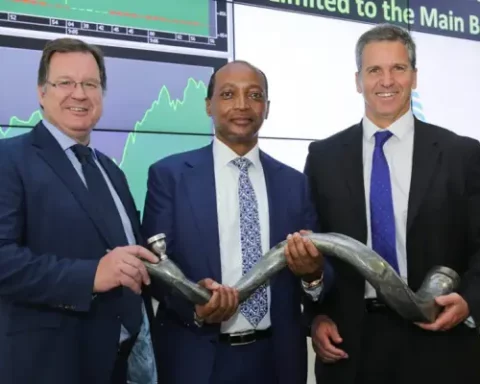Here’s hoping Absa has finally replaced that revolving door in its CEO’s office with one that is heavy, solid and impervious to the culture that has dogged one of South Africa’s biggest banks for years.
The lender has poached Kenny Fihla from Standard Bank, where he served as deputy chief executive officer, as its next CEO – a move aimed at ending years of leadership turmoil at Absa following the departure of Maria Ramos in 2019. The bank has cycled through a series of short-lived appointments to the top job, fuelling perceptions of instability and strategic drift.
While the shock resignation on Sunday of Fihla – he was an 18-year veteran at Africa’s largest bank – marks a major setback for Standard Bank, it still has a relatively deep bench from which to draw, with CEO Sim Tshabalala three years from retirement. Absa’s retirement age is 63, while Fihla is 55 this year.
But the real plus is for Absa, which now has a real shot, “of stable leadership”, Kabelo Moshesha, an analyst at Mazi Asset Management, tells Currency. “That they got [Fihla] was a pleasant surprise. To get someone of his calibre from the likes of Standard Bank tells you how serious Absa is.”
Absa has been under the temporary stewardship of Charles Russon since October 2024, following a series of botched appointments under the chairmanship of Wendy Lucas-Bull, who left in 2022.
First, non-executive director Rene van Wyk took over the hot seat from Ramos on an interim basis until Absa’s first black CEO, Daniel Mminele, started. He quit in April 2021 after just 15 months, due to strategic differences with the board. Former finance director Jason Quinn acted as interim CEO for a further 11 months, until another internal candidate, Arrie Rautenbach, was appointed “permanently” in March 2022. He announced his retirement under a cloud in August 2024.
Chair Sello Moloko will be determined to avoid another misstep.
The strategy introduced by Russon, the former head of Absa’s corporate and investment banking unit, has prioritised returns over market share. He’s described the current trajectory as a “continued recovery story” following muted earnings in 2022 and 2023. Russon has evidently won some backing from the market given Absa’s share price gains: the stock is up almost 25% over the past year.
Fihla, who will join Absa on June 17, is expected to focus initially on “steadying the ship” before tackling “the real test, especially in the retail segment of the business”, says Moshesha. Like Russon, Fihla brings a strong corporate and investment banking pedigree, having headed Standard Bank’s division for seven years.
“He will probably continue in the direction that Russon was taking the bank in,” says Moshesha. “I don’t think much of what he did will be undone – those were steps in the right direction.”
That included curbing retail lending to improve credit quality – a strategy Russon warned would result in “subdued” loan growth.
A ‘heavy blow’
Standard Bank meanwhile made no effort to mask its disappointment, describing Fihla’s decision as “a heavy blow for us”, though the bank says it’s “blessed with a surfeit of talent and deep succession pools”. Fihla, however, was supposed to be part of that talent pool and there’s talk he was being groomed to succeed Tshabalala.
Under Fihla’s leadership, Standard Bank’s corporate and investment banking unit doubled profits between 2017 and 2024. He was promoted to deputy group CEO in August 2024, also assuming responsibility for the South African operations from Lungisa Fuzile.
“Kenny has made an immense contribution to our group in his various roles over the course of his career with us and is recognised as an accomplished banker and leader in South Africa, on the continent and globally,” Standard Bank said in a statement. “We are fortunate to have been able to draw on his unique combination of experience and wisdom in business, government and the labour movement.”
Radebe Sipamla, an investment analyst at Mergence Investment Managers, says Fihla ran Standard Bank’s corporate and investment bank “like a machine”, helping cement its dominance both domestically and across the continent.
His initial priority at Absa, Sipamla says, will be putting the right strategy in place so the group can “focus externally again”.
Another urgent item on the agenda will be improving Absa’s digital offering, which, Sipamla says, is a “big weakness”. “They’ve spent billions, but it hasn’t translated into higher non-interest revenue,” he notes, contrasting it with Capitec, which is “way ahead”.
Most importantly though, “the board will need to back [Fihla] fully to make difficult cultural and strategic changes at Absa that are necessary to ensure the business can navigate the rapidly changing banking environment in South Africa, where fintechs and non-traditional financial services are set to make aggressive encroachments into Absa’s revenue streams,” Sipamla says.
This story was updated to correct the analyst’s quote in the fourth paragraph, adding Fihla’s age and Absa’s retirement age in the third.
Sign up to Currency’s weekly newsletters to receive your own bulletin of weekday news and weekend treats. Register here.










